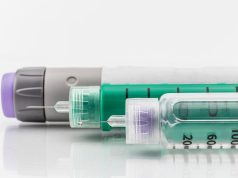Approved for use with PD-L1 IHC 22C3 pharmDx test
FRIDAY, Oct. 2, 2015 (HealthDay News) — Keytruda (pembrolizumab) has been approved by the U.S. Food and Drug Administration to treat advanced cases of non-small-cell lung cancer (NSCLC) with tumors that express the PD-L1 protein. Keytruda is approved for use with the PD-L1 IHC 22C3 pharmDx test, a companion diagnostic.
The safety of Keytruda was studied in 550 patients with advanced NSCLC. The most common side effects included fatigue, loss of appetite, dyspnea, and cough. Because the drug affects the immune system, less common side effects could include rash and vasculitis, the FDA said. Pregnant women should not take Keytruda, which could harm a developing fetus, the agency warned.
The effectiveness of Keytruda for NSCLC was demonstrated in a subgroup of 61 patients with advanced NSCLC that progressed following platinum-based chemotherapy or targeted therapy for certain genetic mutations. These patients also had PD-L1 positive tumors based on the results of the 22C3 pharmDx test. The participants received 10 mg/kg of Keytruda every two or three weeks. The researchers found that tumors shrank in 41 percent of patients treated with Keytruda and the effect lasted between 2.1 and 9.1 months.
Keytruda has been approved under the agency’s accelerated approval program, which allows approval of drugs to treat serious or life-threatening diseases based on clinical data that demonstrates reasonable likelihood of clinical benefit for patients. Survival benefit or disease-related symptom improvements in patients being treated with Keytruda have not yet been established.
Keytruda is marketed by Whitehouse Station, N.J.-based Merck & Co.
Health News Copyright © 2015 HealthDay. All rights reserved.








